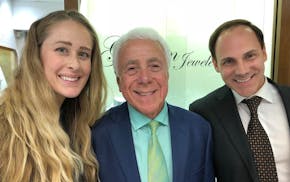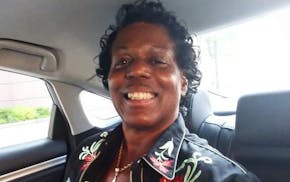Internet strategies consultant Rex Sorgatz was about halfway through writing his "The Encyclopedia of Misinformation" when Donald Trump was elected.
His book is not about Trump, although the man in the White House "pops up in weird places" like the subject of the Woody Allen movie "Zelig," according to Sorgatz. "I didn't want to make the book totally about [Trump]. That would be too obvious," he said. "There are moments where it's very clear that I am talking about him but I don't say his name."
A die-hard Minnesotan who has lived in NYC for 11 years, Sorgatz admitted that it once took a little deception on his part to maintain ownership of a cellphone with a 612 area code. Sorgatz's deceptions won't be the focal point of his appearance at 7 p.m. Tuesday at the new Finnegans Taproom in Minneapolis. The event will be a dialogue between Sorgatz and his pal, the wonderful Mpls.St.Paul mag senior writer Steve Marsh."We will discuss all those hyper-modern subjects: fake news, filter bubbles, crisis actors, social disinformation, and of course, the scourge of Tide Pods," wrote Sorgatz in an e-mail that also promises a reading, book signings and puzzles. It is free, but he recommends you RSVP at tinyurl.com/ycg9e3nm.
You may fondly remember Sorgatz as the founder of the late MNspeak.com, an early community news site he founded 13 years ago. "You might compare it today [with] Reddit, if Reddit was just local. It was before its time," he said. Sorgatz was behind a series of Minnesota-themed T-shirts sold to raise money, one of which got seriously under the skin of someone keeping a low profile on the prairie these days. More about that in Part 2.
Q: Describe "The Encyclopedia of Misinformation."
A: It actually is an encyclopedia organized from A to Z. There are 300 entries in it. The conceit is that it's a book packed with information about disinformation. Once you get in there you see that I really play around with the idea of it being an encyclopedia. There are graphics, illustrations and charts and puzzles and footnotes up the wazoo. I honestly think about it as an interactive essay, not to get too pretentious about it. It fakes being a reference book so I can talk about all these different topics that relate to deception, in the broadest sense of the word, through history and technology, in the social sciences.
Q: Misinformation or disinformation?
A: I use both terms almost interchangeably. Social scientists would scold me and tell me they are different things, and that's fair. Misinformation is effectively something that is untrue that is passed around as truth, and disinformation is something untrue that is passed around as true intentionally. Like an urban legend is misinformation passed down by people who don't know they are doing it, where disinformation is someone intentionally trying to deceive you.
Q: How did you come up with the concept for this book?
A: I have been a writer on the side, and I've been keeping a list of things I want to write about, if I had more time to write articles. It was a gigantic list of about 800 items. I really only get to write about two or three things a year. At some point, a couple years ago, I decided I should try something new, try writing a book. So I opened up my list and thought I'll just pick one of these things that interests me most. Then I had this crazy idea, "Wait, is there any pattern in all this stuff?" There sort of was. So many of the things that interested me have to do with either how people deceive each other or themselves. So I thought, "I wonder if I could write a book about all of these things?" That's what I did. I was about halfway done when Trump got elected. All of a sudden it went from kind of a playful book to a somewhat more serious book. It's also got serious social science and politics in it, but it's also got tribute bands [laughs] ...
C.J. can be reached at cj@startribune.com and seen on Fox 9's "Buzz." E-mailers, please state a subject; "Hello" does not count.

C.J.: Jerry O'Connell gets support from Wendy Williams for talk show




